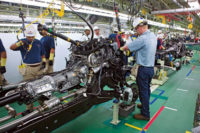ZURICH—A global survey conducted by ABB has revealed that a significant workforce education gap could derail efforts by U.S. and European manufacturers to reshore or near-shore operations to build resilience in the face of global challenges.
“The world is constantly evolving. Businesses are shifting existing structures and adopting new technologies to future-proof their operations for a variety of challenges and uncertainties, with robotic automation playing a key role,” says Sami Atiya, president of ABB’s robotics and discrete automation business. “We need significant investment in continuous education to prepare our existing and future workforce to thrive in an age of robotics and automation, important not only to prepare for the widespread shifts we are seeing, but to create prosperous societies going forward.”
ABB’s 2022 survey of U.S. and European business leaders revealed that 74 percent of European and 70 percent of U.S. businesses are planning to reshore or near-shore operations to build their supply chain resilience in response to labor shortages, the need for a more sustainable global footprint, and global uncertainty.
The majority of these businesses view automation as the enabler of these shifts, with 75 percent of European and 62 percent of U.S. businesses surveyed planning to invest in robotics and automation in the next three years to facilitate this shift in operations.
Despite this appetite for automation, ABB’s 2022 global education survey found a significant gap in the education and training needed to ensure the skills necessary for work in the increasingly connected and automated workplaces of the future. Of the global education professionals surveyed, 80 percent believe robotics and automation will shape the future of employment in the next 10 years, while only one in four education institutions currently use robots as part of their teaching programs.
To help bridge the skills gap, ABB has bolstered its global robotics and automation education program with new training centers, including a new $99.9 million global innovation and training campus in Austria. The new site, along with other new regional training centers in the U.K., Berlin and Brazil, expands ABB’s training facilities to over 40 sites globally, educating more than 30,000 students and apprentices annually.
Through more than 100 global partnerships with schools and universities, ABB generates curriculum materials with education providers to help educate future generations and prepare them the jobs of tomorrow.
“Change needs to happen now,” adds Atiya. “As companies turn to robotic automation to offset labor shortages, improve efficiency and increase resilience, workers need the skillsets to use automation to perform their jobs and augment their own roles. Businesses need to join forces, cooperating with education institutions and governments to ensure that society is prepared for jobs of the future. Only through this can we fully utilize flexible automation and unlock value from the ongoing reindustrialization.”


